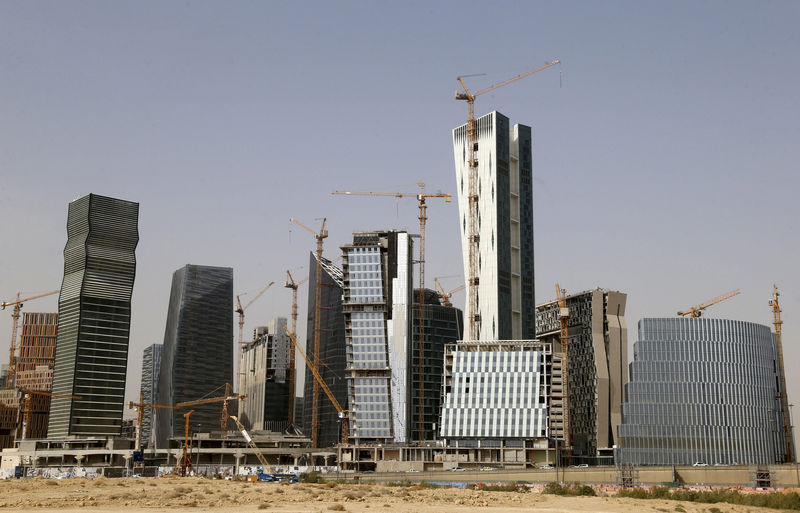By Tom Arnold
RIYADH (Reuters) - Saudi Arabia's banks are preparing for muted lending growth this year, providing a reality check on the state of the country's economy and government efforts to stimulate growth.
Saudi Arabia unveiled its Vision 2030 plan in 2016 to transform the country's economy, which is still suffering the after effects of the slump in oil prices, recession and austerity measures to cut the state deficit.
"Vision 2030 is in the future, but we're dealing with the reality of now,” said one senior Saudi banker. “We're having to be more careful and client demand is weak anyway.”
The International Monetary Fund is expecting the Saudi economy to grow 1.8 percent this year, but some local bankers worry their assets are shrinking as loans get repaid but new borrowing opportunities dry up.
The banks also complain that they have seen little benefit so far from the government's 72 billion riyals ($19.20 billion) stimulus plan, announced last year to kick-start the economy.
"The expectation is that the rebound in credit growth will be delayed until the end of 2018," said Olivier Panis, senior credit officer of EMEA financial institutions at Moody's.
"There’s still a lack of confidence from investors about when economic growth will start again and when some of the big projects will be implemented."
Three of the four local banks to report first-quarter earnings so far this quarter, including the two largest National Commercial Bank and Al Rajhi Bank, have revealed shrinking loan growth, setting a gloomy tone to the earnings season.
The Saudi banks subdued outlook contrasts with the enthusiasm of international banks which are keen to muscle into the Arab world's largest economy as it prepares to transform industries ranging from energy to entertainment.
More than a dozen foreign banks have already licenses to operate branches in the country. Citi (N:C) is considering seeking a full license and Credit Suisse (S:CSGN) is seeking one.
CREDIT DEMAND
Credit expansion in the country contracted by 1 percent last year as the economy slipped into recession, the first since 2009. Credit growth for the first quarter was 0.5 percent.
In retail banking, cuts in government energy subsidies have hit consumer spending. Also, the weak economy led to hundreds of thousands of expatriate workers leaving the country over the past year, also denting demand for consumer credit and loans.
Among the banks' corporate customers, appetite for credit also remains weak. Contractors and other companies serving the government are often still waiting to be paid although the government has taken steps to speed up the process.
One banker said because of this situation his bank had raised its collateral requirement on loans to contractors to up to twice the size of the loan from 1.5 times previously.
Fallout from the government's anti-corruption drive on the country's business and political elite has increased caution among the local banks, bankers say.
The after-effects of the corruption purge have also delayed lending to some companies, such as Kingdom Holdings.
Another dampener has been new rules on bad debts. From the start of this year, banks had to comply with IFRS 9 accounting rules, which set out stricter provisions on what banks have to set aside for problem loans.
The banks are also having to meet tighter Saudi central bank corporate lending rules which limit a bank's exposure to a single customer. This means no bank can have exposure to any one client of more than 15 percent of their Tier 1 capital, several bankers said. The previous limit was 25 percent.
With big government-linked companies dominating the Saudi economy, banks are, in some cases, now much more restricted in who they lend to.
"A number of banks are already at the cap for lending to the largest conglomerates, so that's a challenge they will have to manage," said Panis at Moody's.

($1 = 3.7502 riyals)